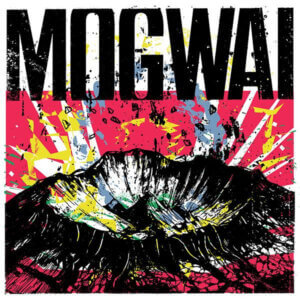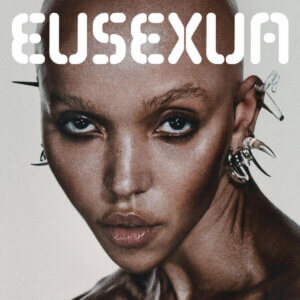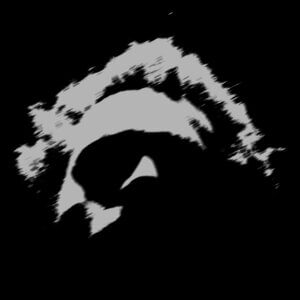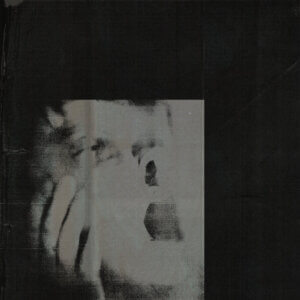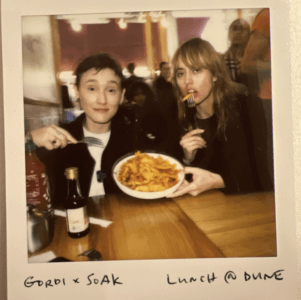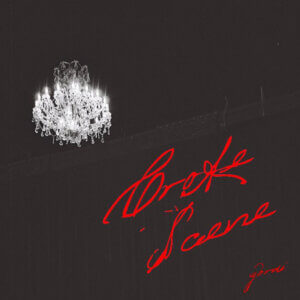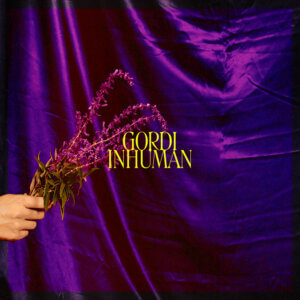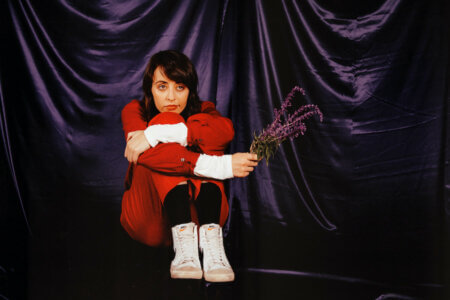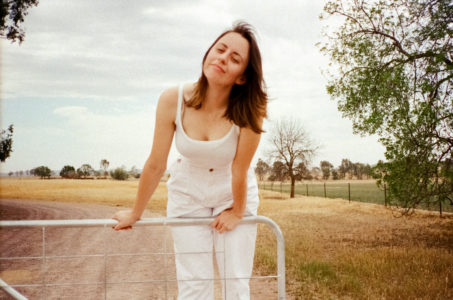Love in the Time of COVID: Gordi on her ‘Lunch At Dune’ EP
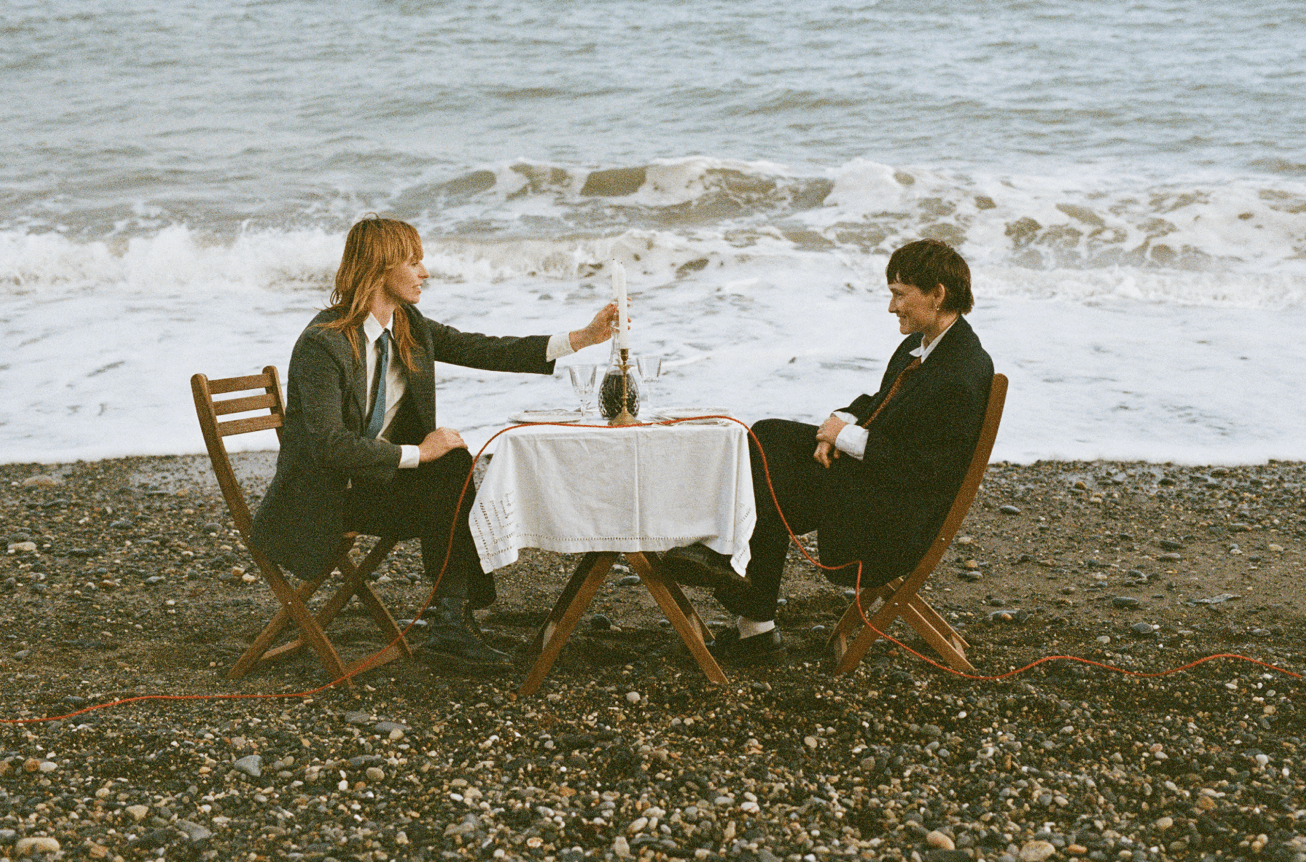
Before she could promote her sophomore album Our Two Skins (released June 2020) in Europe and the US, indie singer-songwriter Gordi had to retreat to her home country of Australia. The world as she knew it was shutting down, the COVID-19 pandemic forced everyone apart, and uncertainty for the future clouded everyone’s mind. Yet, while she couldn’t tour (let alone leave her apartment), that didn’t stop her from writing new music, meeting new artists, and creating some ambitious musical collaborations. The Lunch At Dune EP, released this past November, is the culmination of Gordi’s experience the past four years.
Featuring Irish singer-songwriter SOAK, as well as producer Brad Cook, Lunch At Dune attempts to find human connection from the greatest distances, finding flickers of warmth in the coldest and most isolated corners of the world. It contains two new songs—the spacey, ethereal “Lunch At Dune,” including a live recording and remixed version, and its acoustic counterpart “Reverie”—as well as a cover of Charli Xcx’s “Apple.” All were written, recorded, and produced at different phases of the pandemic era of the 2020s. Now together in one EP, they’ve become a sort-of send-off to the first half of the decade—an acknowledgement of the past before we move onto the future.
Over Zoom (and across continents), Northern Transmissions spoke with Gordi about the making of the Lunch At Dune EP, her first collaboration with SOAK, and how years of writing, producing, and reworking her music has shifted her perspective on her life these past four years.
NT: For the Lunch At Dune EP, I was wondering if you could get into the conception of the song, your collaboration with SOAK and producer Brad Cook, and how the song came together, as well as the EP.
Gordi: I was staying in an Airbnb in London in February of 2020. I had flown over there to promote my second record coming out, and I had a series of interviews and plans. Slowly, the world was shutting down. I didn’t kind of know what every day was going to look like, and suddenly I was on a flight back to Melbourne because the US was closing its borders and everything was escalating, as I’m sure you remember. It was this really disturbing time. Anything that was troubling me, people that were important to me on kind of a day-to-day level, just suddenly was minimized to being absolutely nothing because no one could do anything. It was like the pandemic—really the world shutting down—made us feel so small and insignificant, and that was obviously devastating, but also kind of amazing because it just put everything in this fluorescent kind of light perspective. Like, “What are we worrying about? What are we worrying about day to day? Because really nothing matters.” That was the headspace that I was in when I was in this Airbnb. Then I just started writing some lyrics, and the next day I was scheduled to be in this studio in Camden. I went in, and I just wrote the entire song that day and started like noodling around with guitar parts. A lot of that stuff is in the finished product.
I parked this song for a second, so it had existed for a couple of years. I went to Durham, North Carolina [in 2022] to make a bunch of songs with Brad Cook, and “Lunch At Dune” was one of them. Whenever I’m making a bigger body of work, there’s always a couple of really heavy days in the studio. I’m always writing about pretty like intense personal stuff—it’s kind of why I write in the first place—and the “Lunch At Dune” day in the studio was just really heavy. Like, I felt really emotional: I couldn’t get through vocal takes of the song because my voice was cracking. Brad and I had to go and like sit outside for a while. I’d sort of tried to get myself together, but it’s just always been a song that takes me back to just such an awful time in life. There’s just so much raw emotion in in that song. Brad helped me shape it and brought in a lot of beautiful ideas like a lot of the kind of synth lines you hear, the beautiful pedal steel, and some modular synth stuff. I took all of those files with me back home to this very room in Melbourne, and I just tinkered with it for a couple of months, trying to tame all the stuff that we’d lay it on it. I got to the end of that process, and I thought, I need someone else on this track. The first person that popped into my head was SOAK. I reached out to them; they were fortunately very excited by the prospect. They recorded their vocals at home in Dublin and sent them over to me. I massaged them into the track, and “Lunch At Dune” was born!
NT: It’s interesting to hear that a lot of heaviness and emotions went into the track; you definitely feel that with the lyrics. But there’s also this lightness to it. The lyrics are very spaced out, and they’re meshed with the synths, and the music overall has this very lush, airy feel. How did you decide to like play with the tension between the heaviness of the situation and the lightness of the song?
Gordi: The core of the song is unconditional love. That is the ultimate motivation behind the track. It’s sort of like, Stop, letting all these things get on top of you to the point where you can’t move because in a second, all of it is taken away, and none of it matters. I know in Australia, if you lived by yourself, you could have a nominated person who you could spend time with, and I think that says it all. If we have nothing else, all we all we truly need to survive is maybe just one other person.
In terms of the lightness, I noticed the tension between the music and the lyrics—and I find it interesting to make those two things at odds with each other—but that wasn’t specifically what we were trying to do here. I think like we were trying to make every arc, every line, every instrumental part, filled with emotion, but we didn’t want it to feel like devastating either. I think we also had in our head a wistful yearning emotion that we also wanted to get into those harmonic layers. And I think some of the things that helped most are the pedal steel and these octave intervals, where it sort of feels like there’s this huge jump off into the abyss. I think some of those choices do help give it that airy quality, as well as how we treated the vocals.
NT: Another thing that I found within this song, as well as the EP, is the thematic element of isolation. You were writing it in this period of isolation, but did you find that, through the collaboration with the different artists, as well as some of the lyrical choices that you’ve made, there’s also gave a second meaning to the album about coming together and finding community, even if that community happens to be over screens, or through email exchanges, or audio file exchanges, etc.?
Gordi: Yeah, even though I think these songs were born out of that place, it’s because it was the context of the time. I do think what came out in those lyrics is not how awful it is to be alone. It’s about what really matters in life. It’s more about the distillation of what’s really important. When there’s nothing left, and you’re cramped in the house, and you’re not allowed out, what are the things that are going to keep you alive and keep you sane? That ultimately is human connection. It’s always what I’m exploring in my music, but yeah, I’ve also never had such a severe backdrop with which to paint it against.
NT: In the EP, you also have two live versions of “Lunch At Dune,” and SOAK is a part of them. Performing it live in the same space together, it must have like felt like a very different experience from just doing it all online. How do you think the song transformed when you recorded the live version?
Gordi: We didn’t actually meet in person until that weekend. Basically, we only ever communicated online, as people do these days. I wanted to shoot a music video for the song, so I flew to Dublin because that’s where Bridie (SOAK) lives. We had three days together. With a friend of ours who had a camera, we shot the music video on the first day. On the second day, we wandered around Dublin; Bridie showed me the Leprechaun Museum and what an Irish Chinese spice bag is, and we drank a lot of Guinness. (They even tried to teach me how to split the G on a Guinness in a single gulp!) On the third day, we recorded this live version of “Lunch At Dune.”
We’d been wondering where and how should we do the live version. I had sketched out an idea for how we could perform it, because obviously it’s such a full arrangement. And I was like, I want to just strip it right back. I was staying in this beautiful old place outside of Dublin; it looked like some old castle on the inside and had this beautiful, big kitchen. And I was like, I just want to do it in here. It was pretty magical the first time we sang it in the room together. I have a couple of these things called bullet mics, which, while you usually use them on a harmonica, I liked because they have quite a dull but nice, warm tone when you hold them up to your mouth and sing into it. I put my headphones on and set up the track, and as I’m playing it and singing the first verse, Bridie’s voice comes in my headphones while they’re standing right next to me, and I was like, Oh damn! It really felt magical. Boiling the track down to those bare bones illuminated some of its beauty even more, and the lyrical content that’s about connecting with someone… Like there I was in the room, just Bri and I, connecting on that kind of level. I didn’t want to put it on the EP unless I thought we’d done a good job, so I was really pleased that it came together.
I then got obsessed with that idea of reworking the track because it had been in my life for so long now—four years at this point. So, when I got back to my place in Los Angeles, I started to dissect the stems of the original track, took a bunch of stuff out, slowed a bunch of stuff down, and pulled out all these like crazy harmonic stuff I made with Brad in the studio. That also ended up going on the EP as the “Lowboy Version.”
NT: How do you think [pulling apart something that you’ve worked on for many years] changed your perspective of music composition? That’s also been a theme this year with artists: music isn’t this fixed object—you can always change it, remix it, etc. How do you think the experience with working on this song for so long has changed your approach to thinking about music in general?
Gordi: It’s almost like the creation of music is catching up to the way it’s being consumed. Like, we’re not just selling copies of vinyl anymore. I love that when artists [remix], you can tell that they’re engaged with their song because of that kind of reimagining. My music is very note-heavy and layered because I love chords and harmonics, and in order to have harmonics, you got to have a lot of notes. What was really beautiful in breaking those stems apart was that I’d hear how all these different parts in the scheme of the song contribute to the whole. I just found so many beautiful arcs that Brad and I made together—beautiful kinds of synths playing these roles that you sort of forget about in the song, but then if you took it out, I’m sure that the absence would be noted. It was nice to go back through and basically look at all the decisions we had made. And with this song having been out, and people having connected to it, I’ve honestly been a little taken aback. I connect with it because I wrote it, but it surprised me just how much people have really taken it as their own. So, the remixed version was just maybe a chance for me to reclaim it for a second before giving it back.
NT: The Lunch At Dune EP also features “Reverie,” a song that you wrote and produced by yourself, as well as a stripped back cover of Charli Xcx‘s “Apple.” Could you speak a little more on the inclusion of these two singles in the EP, and how you think they fit in with the themes of Lunch At Dune?
Gordi: I always wanted “Reverie” to be on this EP because I thought if it wasn’t, it would never come out. I have a soft spot for that song, but it doesn’t quite fit on the on the body of work that’s ahead. I wrote it probably in the middle of 2021; by this point we’re all well into the pandemic era. I’m living in Melbourne, and during the pandemic, I did a lot of work because I am also a medical doctor. I had sort of put that on the back burner at the start of 2020, ready to return to my music career, but then the world had a different agenda. And so, I was basically working in hospitals during the pandemic because I didn’t have a constant, regular job. I was on this list of available medical professionals who could go and be casually employed at different hospitals where there were staff shortages because of COVID. Most of these places were in rural and regional parts of the state. So, I would get called up on, for example, a Friday or Sunday night. I’d go to the airport, get on a tiny little plane—like no more than 15 other health personnel on it—and we would all fly out to hospital somewhere, work there for a week, fly back. And then I would have a week off.
On my weeks off, I had this little studio above a pub in Brunswick, which is a part of Melbourne. It was a really run down room. There were pigeons living in the walls, and you can even hear them in some of the vocal tags if you isolate them. So that was what was going on in my life when I wrote “Reverie.” I was really pissed off. I was like, This is not what I thought my life would be like! I had thought at this point I’d be on tour promoting the records that had come out and that I’d worked so hard on, and I thought I’d never get the chance to perform in the states in Europe again. I would float away in these daydreams, remembering the good times, remembering when I was doing the thing that I really loved. And even though that was really comforting at times, daydreaming was also like felt kind of dangerous because then I had come to and be like, Well, I don’t know when that’s ever going to happen again, and life now is largely unenjoyable! “
Reverie” was fumbling around with that idea of the joys and the perils of daydreaming about something that’s impossible. I wanted the song to sound like a thought that I could put in a glass jar on my shelf and take off some days to turn in my hands. I parked the song for ages, and then when I was going to put this EP together, I thought that this would actually be a really beautiful, B-side to “Lunch At Dune.” In the last few months, I revisited the track and really tried to come back to that image that I’m talking about being inside this glass jar, and I tried to infuse that into the production of this song. I spent a few days at a little space in LA and brought it together. I did a lot of the recording through like the bullet mic that I was talking about before; I wanted to treat the track like a nice, short reflection.
“Apple,” on the other hand, was very much an afterthought, to be honest. It was this thing that had happened over the last few months—obviously Charli happened to the world this year. I was home at my parents’ house, which is on a farm four hours west of Sydney, and I was playing the piano. I was thinking about “Apple,” and I brought the lyrics up and started playing some chords. God, this song is gut wrenching. Like, it’s so sad, particularly when you play sad chords underneath it. I put a snippet of it up online, and one thing kind of led to another, and people seemed to really engage with the song. And so then I said to myself, You know what? I’m going to just like give myself like three quarters of a day and just churn this out—just create this this whole track. I did, and then I shared that online as well. People seemed to connect with it. I had this EP coming out anyway, so I put it on there because, for these songs that sort of have come across such different timelines, this felt very now.
NT: Yeah, when you consider all three of these together, and now knowing the background behind all three songs, it does kind of show your artistic process throughout these past four years of just like, something that you wrote at the very beginning of this era, something that you wrote in the middle of it, and then something that just happened now. I think with the “Apple” cover, the reason why people connect to it, especially when slowed down and in dialogue with the other songs, is that there’s also something about escapism that comes through. Wanting to get away, and wanting to be somewhere else. So, yeah, I think it makes logical sense that it’s there.
Gordi: Yeah, I like the escapism theme in both “Reverie” and “Apple.” I think that’s a really nice way to think about it.
NT: With “Reverie” too, it’s interesting that you consider it a B-side to “Lunch At Dune.” I think that in many ways, lyrically and musically, it feels like you’re in like a single room, whereas in “Lunch At Dune,” it feels like you’re in space, where there’s unlimited room. So, I was wondering if you had that contrast in mind when designing the EP?
Gordi: Something I love about “Lunch At Dune” is that it feels like it’s a very expansive track. I like a B-side in a traditional sense, where it’s not overdone. It’s not overthought. It’s just the essentials. I wanted it to be the essentials in a considered, focused way, so it was nice to have “Lunch At Dune” as that counterpoint where I could come back to “Reverie” and know that I don’t have to make this song into something that it’s not. I don’t have to give it some huge moment. It can just sit in its own space.
order Lunch at Dune EP HERE
Latest Reviews
Tracks
Advertisement
Looking for something new to listen to?
Sign up to our all-new newsletter for top-notch reviews, news, videos and playlists.
